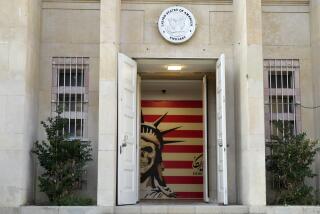Korea Students Protest U.S. Envoy’s Visit to Kwangju
- Share via
SEOUL — Hundreds of radical students burned effigies of U.S. Ambassador Donald Gregg and President Roh Tae Woo on Monday in the southern city of Kwangju to protest the envoy’s visit, news reports said.
A separate group of 100 protesters threw human excrement and tear gas powder at a police station near the U.S. Cultural Center residence that Gregg visited, the reports said.
Gregg, who apparently did not see the protests, was the first U.S. ambassador to visit the city since a 1980 civil uprising in which 200 civilians were reported killed and 1,500 wounded.
Many Kwangju citizens believe Washington condoned the mobilization of the Korean military to put down unrest and silence dissent. Washington has denied the allegations.
About 500 radical students yelling anti-American slogans battled 900 riot police with firebombs and rocks at Kwangju’s Chosun University, said Yonhap, the South Korean news agency.
Fierce fighting continued for an hour inside the campus after police moved in to break up a rally, Yonhap and newspapers reported. The troopers were supported by two armored vehicles firing tear gas, the reports said. No injuries or arrests were reported.
“Gregg came here under a scheme with Roh Tae Woo trying to unilaterally shelve the Kwangju issue,” Yonhap quoted a student leader at the rally as saying.
Police have been on alert since the ambassador arrived Sunday for a three-day visit. News reports said he was protected by plainclothes officers.
The Hankook Ilbo, a Seoul daily, said police had advised against Gregg’s visit, but U.S. officials said an explanation of Washington’s role in Kwangju should be resolved through dialogue.
“I came here not to make an apology but to express regret and condolences to Kwangju citizens,” Gregg said Monday, according to news reports. He also denied any U.S. involvement in putting down the uprising.
Gregg said the United States urged the South Korean government in 1980 to settle the protests in Kwangju peacefully, “but our influence was not enough over the South Korean government,” Yonhap said.
More to Read
Sign up for Essential California
The most important California stories and recommendations in your inbox every morning.
You may occasionally receive promotional content from the Los Angeles Times.













